David Dubrow's Blog, page 20
August 29, 2017
Book Review: My Tired Shadow
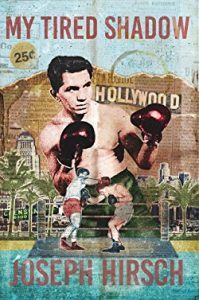 There’s little to like about Ritchie “Redrum” Abruzzi, the protagonist of Joseph Hirsch’s My Tired Shadow. A former pro boxer, Ritchie’s also a bully, a thief, and a shit who makes his money by doing the only thing he’s half-way good at: beating people to a bloody smear with his fists. So no, I don’t like him at all.
There’s little to like about Ritchie “Redrum” Abruzzi, the protagonist of Joseph Hirsch’s My Tired Shadow. A former pro boxer, Ritchie’s also a bully, a thief, and a shit who makes his money by doing the only thing he’s half-way good at: beating people to a bloody smear with his fists. So no, I don’t like him at all.
But damn it, I do love him. How can I not? He’s me. Or, rather, he’s the part of me who yearns for greatness but gets in his own way every time. He’s smart enough to know what he’s capable of, but not strong enough to overcome his own weaknesses. His needs. His anger. Forged in the blood and sweat and spit of the boxing ring, Ritchie’s both the gold and the dross, and that’s what makes him such an unforgettable figure in a fast-reading novel that’ll leave you gasping like a fighter who’s just taken a shot to the liver.
Set in the seedy, dirty, crime-ridden Los Angeles the limp-wristed Hollywood types glorify but never condescend to really capture, My Tired Shadow chronicles the tail end of Ritchie’s descent as a failed pugilist eking out a living as a street fighter to the upswing, when a wealthy B-movie producer picks him to star in his new straight-to-video flick Zombie Boxer.
If you didn’t know much about boxing before reading it, you’ll definitely learn enough to get your nose broken by the end of the book. Full of both physical and emotional violence, it’s a brutal, pathos-filled tale told well, with vulnerable characters who come up against the ugliness that is Ritchie’s temper, and often pay a terrible price.
An exchange with a British journalist fan who’s seen Ritchie’s fights on YouTube and wants to spend time with him sums up Ritchie’s character well:
Ritchie cut the wheel. “You don’t got to drink, but you’ve got to drink if you hang with me.”
“Why?”
“Because I don’t want you studying me like a bug under a microscope all night. Just get hammered with me, be my paisan for the next couple hours, then you can wake up in the morning and hammer out whatever you want on your typewriter.” Ritchie gunned it again.
That’s Ritchie: hammers and hammers and guns.
As a writer, Hirsch doesn’t let up even if you begged him to, and My Tired Shadow is over way too quickly, which is the highest praise I can give it. Reading fiction’s an escape, right? That’s what they say. But how do you escape Ritchie Abruzzi once he’s got his hooks in you?
You don’t. Once you’ve read about him, he’s always with you, like him or not.







August 24, 2017
Writers, Politics, and Sales
Western culture has become so addicted to outrage that every disagreement, no matter how minor, can become a permanently alienating conflagration. How this came to pass is the subject of another discussion; suffice it to say that there are many elements involved, and as much as we’d like to place the blame at the feet of our ideological opponents, this is one problem that we’ve all contributed to. Social media’s influence on communication is a major factor, from email to Facebook to texting to Twitter. When you contrast that with how important body language is in communication between individuals, you can see the inherent problem with our technological society: we’re all outraged, we’re all talking, and we’re all missing a huge component of what we say to each other. Tone, gesture, and expression are lost in words displayed on a screen, and yet we speak to each other in this format all the time. So it’s no wonder that we’ve become so alienated, so stressed, so divided.
 This alienation has become so acute that even business owners have become comfortable telling potential customers that they’re not welcome if they don’t adhere to a certain political viewpoint. On the writer’s side of things, Stephen King mocked every Trump voter as an imbecilic buffoon. These men are wealthy. They don’t need your business. But they’re also major contributors to the outrage culture that divides us. Not because it’s good business for them to do so, but because it pleases them to do so. They can afford to alienate you.
This alienation has become so acute that even business owners have become comfortable telling potential customers that they’re not welcome if they don’t adhere to a certain political viewpoint. On the writer’s side of things, Stephen King mocked every Trump voter as an imbecilic buffoon. These men are wealthy. They don’t need your business. But they’re also major contributors to the outrage culture that divides us. Not because it’s good business for them to do so, but because it pleases them to do so. They can afford to alienate you.
The vast majority of writers don’t have that status. We have to write, market, sell, and build fans through hard work. Even those of us who are more traditionally published.
A symptom of this outrage culture is the tribalism that comes with identifying as a member of a certain group. You’re a moderate. You’re a progressive. You’re a conservative. You’re a Berniebro. You’re a NeverTrump conservative. You’re an independent. You have your tribe and the people from other tribes are your enemies. So who you voted for becomes a defining characteristic, even though it shouldn’t be. You know deep down that not only are you larger than your politics, most everyone else is larger than their politics. And yet you have a tribe.
I write about current events often, and because our outrage culture uses politics as its chief bludgeoning tool, current events collide with politics all the time. There’s no point in avoiding it, even if I were so inclined. What I don’t get into are the conflicts over presidential politics. I didn’t do it during the Obama years, and I won’t do it during the Trump years, however long or short they may be. Such discussions are always pointless.
You may be of the opinion that approximately half of the United States knowingly voted for a reprobate. That Trump’s a racist who employs white supremacists and bigots and homophobes. And you’re comfortable saying so, even though you’re tarring the president’s supporters with a horribly ugly brush; after all, if they voted for a racist, they must be racist, too. Or maybe they’re just stupid. As a writer, as a seller of your words, is telling half your audience that they’re idiots and/or racists the best sales pitch?
Believe it or not, there’s nothing on this planet less risky, controversial, original, edgy, or witty than calling Trump a racist or buffoon. The majority of your writer friends will agree; most writers tend to be on the left end of the political spectrum. You’re in good company. You’ll get retweeted, Liked, and lauded by your fellow scribes. Good for you: you’ve signaled your feelings to the tribe. You’ve expressed your just outrage and made your buddies happier for it.
For everyone else, those writers and readers who don’t agree, or who are just plain sick of the intrusion of divisive political rhetoric into what is, for most of us, an escape, you’ve alienated us. Nobody wants to read, let alone work with, someone who implies that he’s a racist and/or an ill-informed bigot.
Presidents should never be above reproach, criticism, or ridicule. Mature adults must be able to handle that and more, particularly when it’s aimed at their favorite politician. But it doesn’t mean they have to like it, and it definitely doesn’t mean that they will gladly pay for the privilege. I read fiction from writers I disagree with all the time. But once those writers descend to the ugliness of tribalistic name-calling based on something so stupid as a political difference, I’m done with them. I’m under no obligation to use my limited time on this planet to help someone who’s implied I’m a bigot sell books.
How many writers have you heard of who were kicked off of a project for having a left of center political viewpoint? My guess is that the number’s vanishingly small. Now flip it: how many writers do you know who were kicked off a project for having right of center politics?
Well, you know one: me. I was kicked off the writing staff of the horror site Ginger Nuts of Horror for expressing, in my own space, a political viewpoint that millions and millions and millions of other people share. I bring this up not as a “woe is me” lament, but to point out the silliness of our outrage culture. That’s where we are: tribes. And if you’re in the wrong tribe, you’re out. You’re an unperson. For similar stories, check out Nick Cole. Or Kevin Strange. Or David A Riley. It happens rather a lot on one side and not on the other.
Even if the tribalism doesn’t bother you and the outrage gives you that dopamine hit you need to get through another paragraph, another page, another day, the smart thing to do as someone who wants to sell more books is to not insult your audience or colleagues. You need them both.







August 21, 2017
Odds and Ends 8/22/2017
 If you are reading this you have survived the Great Solar Eclipse of 2017. The world has (probably) not ended, civilization has not (yet) collapsed, and various Rapture-like disappearances have (likely) not come to pass. If you have also survived the Great Mayan Apocalypse of 2012, not to mention Y2K, I salute you: 2017 needs more people of your caliber.
If you are reading this you have survived the Great Solar Eclipse of 2017. The world has (probably) not ended, civilization has not (yet) collapsed, and various Rapture-like disappearances have (likely) not come to pass. If you have also survived the Great Mayan Apocalypse of 2012, not to mention Y2K, I salute you: 2017 needs more people of your caliber.
Even though nobody’s asked for my thoughts regarding Confederate monuments, I will provide them anyway, because I’m generous. Keep in mind that I’m white, Jewish, a Yankee, and my family came to the United States after the Civil War, so those of you who find identity politics important may freely disregard anything I say about this or any other subject. In any event, it’s ludicrous that anyone of conscience can tolerate the endlessly-outraged mob destroying Confederate statues across the U.S. This is a local issue and should be handled locally, through the legal process. You don’t want General Robert E. Lee memorialized in the town square? Put his monument’s removal to a vote and let the people who have to see it every day decide. If such monuments have been erected on federal land, then those of us outraged by their presence should raise the funds to have them moved to more suitable venues, like battlefields and museums. Otherwise, they stay.
Despite arguments to the contrary, the issue of slavery was always at the root of the Civil War, and the men who went to war for the Confederacy wanted to uphold it as an institution. As horrible as that war was, we fought it, the right side won, and the United States, as a country, has overcome this original sin of slavery to become a moral beacon for the world to admire. None of the destructive maniacs bent on erasing this history through violence will ever do anything as great as Joshua Lawrence Chamberlain, Ulysses S. Grant, or Abraham Lincoln. Hell, they’ll never achieve anything more admirable than successfully dropping frozen potatoes into a fryolator.
This need to morally preen, to burnish one’s ethical bona-fides at the expense of history, has been in practice for some time. The removal of Lovecraft’s bust from the World Fantasy Award is a prime example. It’s not going to stop with Confederate generals. The Framers of the Constitution are next.
—
We finished watching seasons 1 and 2 of the television show Broadchurch. It’s a crime drama set in a small seaside town where an 11-year-old boy was murdered and a new detective inspector (David Tennant) is brought in to solve the crime. It’s my understanding that Tennant starred in Doctor Who as the titular Doctor, but as I haven’t watched the show since the late 1980’s, I don’t have much experience with it. Broadchurch is entertaining, if a bit draggy in parts, with an unnecessary second season (and, it turns out, an even more unnecessary third season). If you’re a fan of those slow-moving English crime programs, you’ll love Broadchurch. It was kind of a take it or leave it show for me.
(I watch about 90 minutes of television a day: one cooking program and one narrative-style program. Is that a lot?)
—
Even though I like to cook food for my family, as it’s healthier and tastier overall than the vast majority of restaurants one might go to, we do occasionally indulge in a fast food dinner. With that in mind, here is my ironclad list of Top 5 Fast Food Restaurants:
5: Subway – Appalling choice of spokesman notwithstanding, they make tasty sandwiches on the cheap. What’s not to like?
4: Five Guys – My appreciation for this burger joint deserves a post all its own, even though it’s number 4 on the list.
3: Smashburger – The quality of the food is better than Five Guys. Also, real ice cream in the shakes. And smashfries .
2: Tropical Smoothie Cafe – On a video shoot far from home I ate a Jamaican Jerk Chicken Wrap and a Peanut Butter Cup smoothie every day for a week and a half and didn’t get the least bit tired of it. Yeah, I don’t know what’s wrong with me, either.
1: Chick-fil-a – Aside from the food being quite nice, I like being able to tell people that my favorite fast food chicken is seasoned with hate .
You could argue with this list, but you’d be wrong. I didn’t include pizza joints because pizza is its own form of sustenance that transcends mere fast food.
—
Another week, another Hollywood divorce that’s none of our business and yet has become so. Let’s take a look at this quote from Joss Whedon himself, according to his ex-wife:
When I was running ‘Buffy,’ I was surrounded by beautiful, needy, aggressive young women. It felt like I had a disease, like something from a Greek myth. Suddenly I am a powerful producer and the world is laid out at my feet and I can’t touch it.
Well, apparently he did touch it. He touched it a lot. Interesting how he characterized the women who worked for him: “beautiful, needy, aggressive.” What we’ve seen for decades is that Hollywood marriages tend to break up quite a bit, and in spectacular fashion to boot. What we’ve also seen for at least as long is how these Hollywood panjandrums hold themselves up as moral exemplars, preaching ethics to us backwards, cousin-humping hicks in flyover country with every utterance. Maybe it’s long past time that we stopped looking to them to teach us anything except how not to act. Is contributing to the debauched lifestyles of these garbage people the best way to spend your entertainment dollars?







August 17, 2017
Movie Review: Red Christmas
 I reviewed the horror film Red Christmas for The Slaughtered Bird:
I reviewed the horror film Red Christmas for The Slaughtered Bird:
The movie takes place in Australia on Christmas day, where a sixty-something mom brings her family together to celebrate the holiday. As happens all too often during the Yuletide season, the baby she aborted twenty years ago during an abortion clinic bombing has come to crash the party, and the typical slasher antics ensue.
Have you been dreaming of a red Christmas like this one, or is this the Christmas turkey everyone talks about? Only one way to find out!







August 15, 2017
Movie Review: I Saw the Devil
The horror/thriller movie I Saw the Devil came up in conversation not long ago, and it reminded me that I had once written a review of it for the horror site Ginger Nuts of Horror. Jim Mcleod, the proprietor of Ginger Nuts of Horror, deleted all my reviews from his site and called me a Nazi for expressing, in my own space, opinions that millions and millions of other people share. As the review and the movie are both too good to let slide into obscurity, I reprint it here for your reading pleasure.
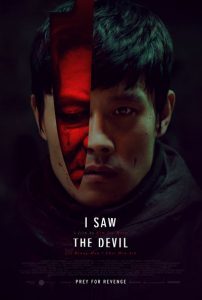 Jee-woon Kim’s I Saw the Devil is an incredibly thoughtful film in both theme and presentation; it’s clear that every frame was chosen to provoke a reaction, to get you to think and feel a certain way. Gory, violent, almost comical at times, it sticks with you the way few movies can. While the theme of revenge and its fundamental futility has approached cliché in modern cinema, Jee-woon Kim manages to take it in a new, disturbing direction. It’s not a mere cautionary tale about the cost of vengeance, nor is it a ho-hum meditation on a man becoming the monster he hunts, but something different, something better: a story of how violence in any form can poison both the actor and the victim, no matter how justified.
Jee-woon Kim’s I Saw the Devil is an incredibly thoughtful film in both theme and presentation; it’s clear that every frame was chosen to provoke a reaction, to get you to think and feel a certain way. Gory, violent, almost comical at times, it sticks with you the way few movies can. While the theme of revenge and its fundamental futility has approached cliché in modern cinema, Jee-woon Kim manages to take it in a new, disturbing direction. It’s not a mere cautionary tale about the cost of vengeance, nor is it a ho-hum meditation on a man becoming the monster he hunts, but something different, something better: a story of how violence in any form can poison both the actor and the victim, no matter how justified.
The film’s attention to detail is immediately arresting: a cart heaped with the remains of one of serial killer Kyung-chul’s victims appears at first a mess of pink flesh until you see the brown nipple of a breast peek out, reminding you that this meat used to be a young woman. Our first glimpse of the secret agent protagonist shows the angelic perfection of his face just so, foreshadowing that he can only descend from here on out. The apparent throwaway scene of Kim Soo-hyeon interviewing Kyung-chul’s estranged parents and unwanted son becomes very important later in the film. From the blood to the effortless malice Kyung-chul exudes, everything is meaningful, everything makes sense.
Fans of Chan-wook Park’s Revenge Trilogy will appreciate Min-sik Choi’s performance as the utterly loathsome Kyung-chul: he’s not quite the badass he was from Oldboy, but he’s far more disturbing. We’re not shown why he kills young women or what makes him a serial killer, which is a deliberate choice: as the Devil to Kim Soo-hyeon’s angel, he doesn’t need reasons to be evil. He just is. His gradual disintegration through the film tells us that evil such as his cannot be conquered by anything other than decisive, righteous action. Kim Soo-hyeon’s petty malice can injure or even maim him, but not stop him.
Kim Soo-hyeon’s descent is more subtle: his prolonged revenge against Kyung-chul serves to knock him from his moral perch as a grieving man seeking to catch his fiancée’s killer, but doesn’t mark him, as such. By not killing or apprehending Kyung-chul at their first meeting, he takes responsibility for Kyung-chul’s subsequent acts of violence and murder. His game with the serial killer has a terrible cost, and not just to him.
The violence and gore, while affecting, isn’t gratuitous; in a film about a good person and a horrible person doing appalling things, the blood drives the story. There are a few hard parts to watch, and they do stay in memory after the credits roll. Despite the lengthy runtime, it’s a riveting, stylistic movie worth at least one sitting.







August 10, 2017
Touch No One by Joseph Hirsch
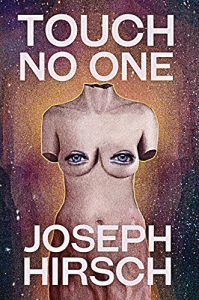 I was honored to write a blurb for Joseph Hirsch’s science fiction/horror novel Touch No One:
I was honored to write a blurb for Joseph Hirsch’s science fiction/horror novel Touch No One:
Joseph Hirsch’s Touch No One is a disquieting blend of near-future science fiction, gritty detective tale, and grotesque horror story. Tightly written, it lifts up the rock covering our post-modern society’s deepest fears, where body modification and digital communication have replaced personal advancement and the intimacy of human contact. From the surgically-altered milk-women to weaponized, genetically-tailored parasites, Touch No One presents a disturbing vision of humanity’s future.
Despite being an indie fiction writer myself, I’d be the first to tell you that, like traditionally-published fiction, indie novels are very much a mixed bag. For every book you don’t want to put down, there are at least fifty that you can tell aren’t worth your time from the advertising copy alone. Touch No One is that one book you want to read all in one sitting, even as you cringe at the world it depicts. Hirsch knows what makes people tick, and can show you their deepest ugliness while making you care about what happens to them. The best books stay with you: Touch No One takes up residence in your guts and won’t leave for love or money.







August 8, 2017
Odds and Ends 8/8/2017
I recently got back from a trip to SeaWorld in Orlando, Florida. While reasonable people might question the wisdom of walking around outside for hours during the hottest, most humid days of the year, my family defies conventional wisdom every day. And sweats a lot. The dolphin show, the sea lion and otter show, and the penguin exhibit were our favorite parts of the park. The penguin exhibit was freezing cold, so it was quite an experience to haul one’s soaking body into a frigid chamber filled with penguins, snow, and the most miserable, parka-clad park attendants I have ever seen. Also, there was a grown man at our hotel pool who had a Mr. Potato Head tattoo on his shoulder blade. It’s not relevant to anything, but I wanted to get it out there before I forgot. The park’s too big to see everything in one day; best budget for two or three. And go when it’s cooler.
—
 HBO is planning a television series that will depict a reality where the South won the American Civil War, or at least seceded from the Union. The very idea has made many people very upset, mostly because they’re concerned that the series won’t be sensitive/woke enough for today’s enlightened audience. This is an argument that makes no sense to anyone paying attention to news and cultural trends: the showrunners are far-left ideologues who fantasized about beheading George W Bush on their other show, Game of Thrones. (They’re lying when they say it was an honest mistake. Mistakes like that don’t just happen.) The showrunners’ obvious intent is to portray how the U.S. today is horribly racist toward people of color through this ludicrous fiction, thereby dividing the country even further along racial lines.
HBO is planning a television series that will depict a reality where the South won the American Civil War, or at least seceded from the Union. The very idea has made many people very upset, mostly because they’re concerned that the series won’t be sensitive/woke enough for today’s enlightened audience. This is an argument that makes no sense to anyone paying attention to news and cultural trends: the showrunners are far-left ideologues who fantasized about beheading George W Bush on their other show, Game of Thrones. (They’re lying when they say it was an honest mistake. Mistakes like that don’t just happen.) The showrunners’ obvious intent is to portray how the U.S. today is horribly racist toward people of color through this ludicrous fiction, thereby dividing the country even further along racial lines.
I watched the first season of Game of Thrones. I also read through the first 1.5 books of the series. But once the presidential assassination fantasies came to light, I decided my entertainment time was better spent elsewhere. I’d have done the same if these shit-throwing chimpanzees had put in an Obama head as a stand-in for Ned’s. Knowing who makes this show, knowing the sickness that’s seething in what masquerades as hearts within the hollow chests of these people, I’m surprised and dismayed that the program still enjoys an audience. Its popularity is as shining a symbol of our culture’s coarsening as one can behold.
—
I finished watching both seasons of Fortitude. The first season, despite its slowness, was tighter than the second, and had a more coherent story. The science fiction elements were subtle, the character relationships were realistic, and the violence was horrifically disturbing. One thing that troubled me was that the setting didn’t seem as cold as it should have, even though the show took place in the coldest part of the world still habitable by human beings. The second season had Dennis Quaid, who was likable but kind of unnecessary. He’s better in more comedic roles. In theme it shifted to more supernatural elements, which muddied everything for no good reason. The Returned Dan made it more watchable than it deserved to be.
—
Over the last week or so I’ve been reading Nicholas Guild’s two-novel series The Assyrian. Historical fiction doesn’t get much better. It’s got blood, sex, intrigue, and a touch of mysticism a la Gary Jennings. The great thing about historical fiction as a genre is that it never loses its relevance.
—
Actors Chris Pratt and Anna Faris are separating. This has nothing to do with me or anyone else except for the people directly involved, but it’s all over the news, so they’ve made it my business. Because it’s now my business, I get to comment on this one line in their social media separation notice (let it sink in that social media separation notices exist and try not to experience too much despair): “We tried hard for a long time, and we’re really disappointed.” They tried hard. For a long time. And they’re really disappointed. So their marriage isn’t a lot different from a football game. Couldn’t they have tried really hard for a very long time? Perhaps they’d be less disappointed.
I don’t pretend to know the stresses their marriage underwent, but I do know that being married isn’t always easy. It’s not supposed to be. Anything worthwhile is difficult to achieve, maintain, and uphold. It’s stupid and unrealistic and damaging to one’s children to go into it thinking otherwise. I’m not unsympathetic to this family, but I can’t help but think that the cavalier wording of the social media separation notice might reflect the nature of the principals’ commitment to marriage.







August 2, 2017
Movie Review: Volumes of Blood: Horror Stories
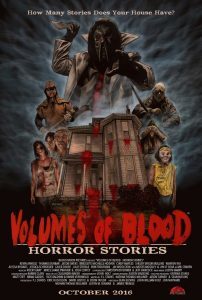 I reviewed the independent horror movie Volumes of Blood: Horror Stories at The Slaughtered Bird:
I reviewed the independent horror movie Volumes of Blood: Horror Stories at The Slaughtered Bird:
VoB:HS (as the movie shall now be abbreviated) is, no two ways about it, a complete gore-fest. There’s enough fake blood, viscera, and ripped flesh to fill a swimming pool, if you were so inclined. Throats get slit, teeth get curbed, intestines get pulled out, and swollen hemorrhoids get sliced open…and that’s only scratching (gouging) the surface. So if that’s your thing, you’re sure to get a gore-boner. A gorection, as it were. A bloody stiffy. A—[Stop it. –ed]
It’s been said that my reviews are sometimes better than the films they deconstruct. Is this the case here? Only one way to find out!







July 28, 2017
Movie Review: Coming Home
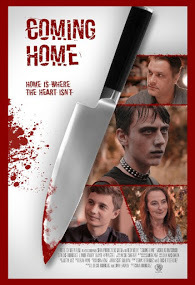 I reviewed the short horror film Coming Home at The Slaughtered Bird:
I reviewed the short horror film Coming Home at The Slaughtered Bird:
The introductory hook works, despite (or because of) its familiarity. The tied-up teenage girl, the knife-wielding antagonist, the pleas for mercy. Soon enough it veers into strange territory and gets even more bizarre from there. The less you know about it up front, the more fun you have when you see it, so mum’s the word on plot.
Check out the rest of the review here.







July 25, 2017
Movie Review: They Call Me Jeeg
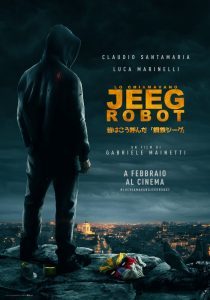 I’ve talked about my dislike of the current state of superhero/science fiction franchises here and here. They’re bloated, overdone, past their prime, and exist as money-making efforts to draw nostalgia-soaked dollars from Boomers and Gen-Xers instead of reflecting today’s culture.
I’ve talked about my dislike of the current state of superhero/science fiction franchises here and here. They’re bloated, overdone, past their prime, and exist as money-making efforts to draw nostalgia-soaked dollars from Boomers and Gen-Xers instead of reflecting today’s culture.
It doesn’t mean, however, that the superhero genre is dead. Movies like They Call Me Jeeg prove that there’s not just life in the genre, but relevance, too.
Enzo, the protagonist of the film, isn’t the kind of hero we want, but he is the hero we deserve. The hero we’ve elevated to primary status in our culture’s misguided quest to eliminate traditional heroic traits in favor of anti-heroic qualities. Faith is pushed out of public life to uphold the fictional value of “separation of church and state.” Honor is considered a quaint, archaic tradition no longer practiced in everyday society. And bravery has been so diluted by overuse that too many of us no longer know the difference between the risking of one’s life to save another and telling one’s parents one’s choice of bedroom partners: both are considered equally courageous. For his part, Enzo possesses very little of these qualities: he’s a petty crook, a ne’er-do-well who falls into a canister of radioactive waste in the Tiber River, emerges with superhuman powers, and uses them to advance his meager position in life. He falls in with a young woman who thinks that he’s the incarnation of an anime superhero named Hiroshi from a cartoon called Steel Jeeg, and the story proceeds from there.
With his sleepy eyes and unkempt, unheroic appearance, Claudio Santamaria is the perfect choice to play Enzo, a man who eats nothing but vanilla pudding and spends his first ill-gotten windfall on pornographic DVDs. You can’t like him at first, then you don’t want to like him, and then you’re rooting for him by the end of the film. Ilenia Pastorelli as Alessia brings a fragility to her role that makes her steal every scene she’s in: she could explode at any moment, so you have to keep an eye on her. Everyone else exists as temporary allies or, for the most part, antagonists. Enzo’s opposite number is Zingaro the Gypsy, a small-time gang leader who Luca Marinelli plays with hilariously violent panache.
Our culture’s obsessions with social media, viral videos, and reality television are aptly lampooned throughout the film, showing us how difficult it is to have a truly secret identity in the 21st century, particularly if you find yourself having to do noteworthy things just to get by. Enzo’s powers, despite that we’ve seen them in superhero-soaked presentations across all known media platforms, still manage to elicit awe, particularly in how he makes use of them.
The movie does hit a couple of snags: it’s a bit long, perhaps longer than it needed to be, so it drags in parts. And there’s a subplot about fascist terrorists in Rome that wasn’t worked into the plot terribly well. Still, it deftly combines humor, pathos, and social commentary in an entertaining, unforgettable presentation that makes you wish for a sequel, even though you know it won’t happen.
They Call Me Jeeg is a great movie. What’re you waiting for? Get watching.










